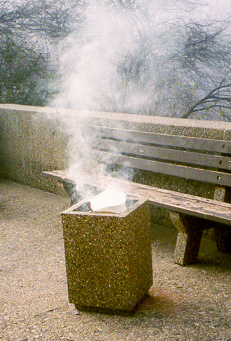Text only
| EDITORIAL: ‘New
books’ create new headaches Back
to Apache home page
It’s that time of year, again. We couldn’t wait for Christmas break to come
and end the 16-week chain of papers, projects, exams, and staring at the clock during
lectures.
The final exams came and went and so did book-buy-back, leaving many of us with empty
pockets and a backpack full of books we couldn’t wait to be rid of.
What exactly is the problem with these companies that publish these textbooks that come
out with a new edition every two years. Do things like basic mathematics, history, and
British and American literature really change so dramatically that every two years, a
"new" textbook is necessary? |
 |
BURN BABY
BURN:
In protest, a pile
of non-
returnable books burns in an
ashtray outside of the college. |
Upon inspection of these "new" textbooks we found that the only real
difference is that the chapters are shuffled into a different order, and a snappy new
cover is added. These upgrades add little, if any, new information to what are primarily
traditional teachings. Things like Shakespeare haven’t changed in over four hundred
years, but for some reason we keep buying copy after copy hidden by a new index or
glossary format.
Who do we have to blame for such an atrocity? The IVCC bookstore? Though it may seem
easy to forward your hatred to the cashier that just emptied your wallet, keep in mind
that the bookstore doesn’t crank those books out of a press in the back room; they
get them from publishing companies.
These companies only earn profits from the initial sale of the book. They don’t
turn a constant profit if the same amount of books stay in circulation; they make their
money from those "new" books, making the current edition obsolete.
Those old books are still useful; they can be used for lining the bottom of a bird
cage, or leveling an uneven table. As some college students demonstrated after making an
unsuccessful attempt to return their textbooks, the books can be used as firewood (See
photo, page 4).